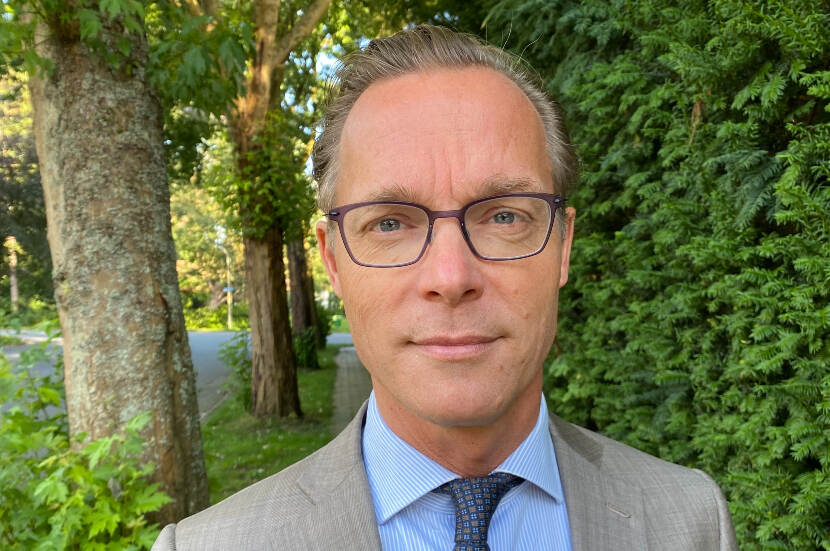'The time for climate action is now. Every degree counts.'
Climate change is happening at breakneck speed. That’s the main conclusion of the UN’s Intergovernmental Panel on Climate Change (IPCC). Action is needed, but how exactly should we proceed? The Netherlands’ new climate envoy, Jaime de Bourbon de Parme, is working at global level to ensure agreements are made on climate action. ‘We can still turn the tide,’ he says. ‘It’s time for decisive action.’

The authoritative IPCC’s sixth climate report says it loud and clear: humans are causing the atmosphere to heat up faster than ever before. Only if we greatly reduce greenhouse gas emissions – and quickly – can we limit climate change and prevent the worst disasters.
You’ve only been the Netherlands’ climate envoy for a few weeks and the UN has now released this alarming report. Were you shocked?
‘You could certainly say that my first few weeks in the job couldn’t have happened at a more crucial time. In addition to the IPCC report, this autumn the international COP26 climate summit will take place in Glasgow. This will be the most important summit of its kind since the one in Paris in 2015.
What did shock me is that global warming is happening much faster than we previously thought. Within 10 years, we could surpass the internationally agreed goal of 1.5 degrees Celsius.
Rapid temperature increase is the reality we’re all facing. The action we take now will determine just how warm the planet gets. Every degree counts.’
What does a climate envoy actually do?
‘More and more countries now have a special envoy for climate issues. This shows the growing realisation internationally that we must take action.
As climate envoy, I’m one of the faces of Dutch climate policy. At international climate summits I accompany our ministers and oversee expert negotiations. In terms of what the IPCC report means for the Netherlands, much of what we need to do has already been set out in writing. So, in the years ahead, it’s my task to work with other climate envoys to get the rest of the world on board. This is, after all, something that affects all countries.’
In your opinion, what impact will the IPCC report have?
‘The IPCC is a clear, scientifically supported wake-up call for the international community. The report irrefutably demonstrates what is causing global warming: us. This is our last warning: no place on earth will escape the consequences.
At the same time, the report also forms a basis for joint action. Every country has endorsed the text. That might sound technical, but it’s an absolutely essential prerequisite if you want to tackle climate change at systemic level.
The realisation that we need to take action has, of course, been growing for some time now. It’s no accident that the EU has announced an ambitious Green Deal and the United States, under President Biden, is once again fully committed to international climate agreements. Major emitters in Asia, such as Japan, South Korea and China, are also making the climate a priority. Now we need to do more to put our words into action.’
The UN says there’s still a bit of time.
‘Yes, that’s right. We can turn the tide if we take fast, decisive action. The world needs to adapt to what’s coming and do everything possible to immediately reduce emissions.
All those young people around the world who took to the streets have woken the world up. They expect more climate action. And rightly so; this is about their future. We’re seeing a move towards turning things around, and even some oil-producing countries are now investing in clean energy. But the change needs to speed up. If we don’t win this battle fast enough, we won’t win it at all.’
Prime Minister Mark Rutte has said that the Netherlands must become a world champion on climate action. Could we be getting too big for our boots?
‘The Netherlands is working on a green transition. But that’s not without its challenges, of course. We’re still playing catch-up when it comes to renewable energy.
At the same time, we’re leading the world when it comes to electric transport and the circular economy. The cooperative ‘polder model’ which underpins our own climate agreement serves as an example to other countries. Our financial sector is also contributing to the fight against climate change and it too has signed the agreement.
I have no doubt that the climate will remain a priority for the new government when it takes office. The greater our ambition, the more credibly we can work on solutions with other countries.
And it’s important to remember that, as a member of the European Union, we’re not on our own. Since the UK’s departure, the Netherlands has been Europe’s fifth-biggest economy. Within the EU we are anything but a “small country”. We’re a voice people listen to. Europe is the third-biggest emitter in the world. So what we do in the EU has a real impact.’
What do you really think; will we manage it?
‘We have a lot of catching up to do, because we’ve come into the game too late. The International Energy Agency is forecasting that global emissions will once again hit a record high in 2023.
We could get dejected about that, but losing faith is not an option. Yes, we’re already experiencing the effects of climate change. Just take the recent heatwaves and floods, including here in the Netherlands, in Limburg. But the IPCC report also shows that awareness is growing of the urgency of the situation.
Everyone has a role to play: world leaders, governments, the private sector, banks, civil society organisations. We’re all in this together, and we can all make a difference. I’ll be working hard on this.’